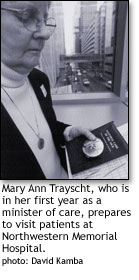|
|
 Caring knows no age limit Caring knows no age limit
Cathedral seniors find service satisfying
By Carmelita Banks
Special Contributor
For ministers of care at Holy Name Cathedral, caring truly knows no age limit—both as givers and receivers.
The ministry reaches beyond its parishioners and provides two-way results, benefiting both the ministers of care and those they visit. Like care ministries in most parishes, it began with home visits to parishioners who wanted Holy Communion but could not attend Mass. Today it offers much, much more, organizers said.
“People get a choice after they have had their training,” says Maryann Hoban, the current ministry director.
Besides providing the initial six-week training required by the archdiocese to volunteer ministers from 30 parishes, Hoban accompanies new volunteers from Holy Name on their first few visits.
Six times a year she schedules meetings, where all the working volunteers from the Cathedral parish and six other parishes can share their experiences and work on their own personal spiritual development. This month, Hoban has scheduled author Joyce Rupp as the guest speaker on spirituality.
“I’m looking forward to seeing [Rupp],” says care minister Minnie Orfanos, 80. “I have four of her books.”
Orfanos, a retired librarian, has been in the ministry for about 17 years. Under the first two directors she received less extensive training before she visited homes and Northwestern Hospital.
Like Orfanos, Anna Buzzi, 78, visits patients regularly at Northwestern Memorial Hospital. Buzzi became a volunteer seven years ago when she arrived from New York. She remembers that Dominican Sister Roberta Popara, a former director of the program, stressed commitment to visiting the 20-30 patients she was assigned each week.
Orfanos, who was assigned to the oncology department then, recalls, “You had to wear a gown and gloves” to comply with the hospital’s sterile regulations.
Under Hoban’s direction and recruitment, hospital volunteers now minister to 10-15 patients located in different departments. They receive their assignments from Hoban at the hospital, no longer gather at the Eucharist at Holy Name before going to Northwestern, and have more freedom to adjust their schedules.
The current count for active volunteers is 80, who range from their early 20s to octogenarians. Some request patients in intensive care, including those with HIV/AIDS; others don’t, because “they don’t know how to handle it.” Still others “learn after they are there a while,” Hoban says.
Most Catholics visited do not belong to the parish, but they are confined in medical and nursing institutions in the area. An average week will include almost 300 visits to Northwestern, 30 to the Rehabilitation Institute of Chicago, 60 to the Warren Barr Pavilion nursing home, and 10 to private homes.
Some volunteers like Orfanos, who is of Greek extraction, have learned Spanish to improve their communication.
The volunteers pray with the patients before and after giving Holy Communion. Then, if the patients want, the ministers visit a while or refer problems to the chaplain or medical professionals. Before they leave the hospital, the volunteers complete a form, indicating what they did at each visit. “We always talk to everyone we see,” even the suffering families, Hoban says.
Ministers at the other sites work similarly. Hoban helps volunteer Mary Schmidt to assign the volunteers at Barr. After referrals from the Rehabilitation Institute and calls from parishioners’ homes, Hoban assigns volunteers to visit them as well.
Each year the pastor meets with the ministers at Mass to tell them what he expects for the following year. Not everyone returns, she said, since some people cannot handle the deterioration in health that they see. Others may find harmonizing with medical instructions for each patient hard. But the rest find their own reasons for returning.
“I wouldn’t be doing it all these years if I didn’t think I was fulfilling a need,” says Orfanos. “It’s a satisfying kind of ministry.”
Front Page | Digest | Cardinal | Interview
Classifieds | About Us | Write Us | Subscribe | Advertise
Archive | Catholic Sites | New World Publications | Católico | Directory | Site Map
|






 Caring knows no age limit
Caring knows no age limit